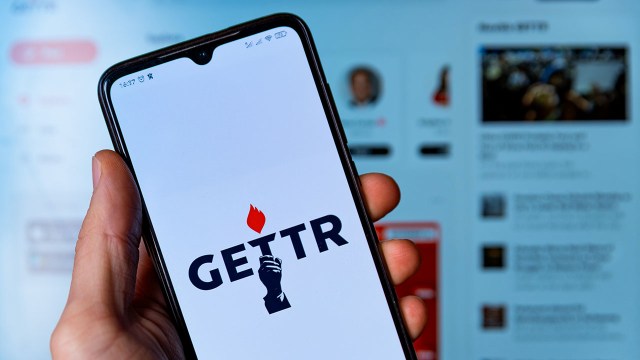
Gettr, founded in 2021, is one of several new sites that have emerged in the social media universe. Many of these sites explicitly present themselves as alternatives to more established platforms such as Facebook, Twitter and YouTube – especially by opposing free speech restrictions they say are found on those sites.
Gettr has proven to be popular in Brazil, and the platform may have played a role in the lead-up to a recent attack on Brazil’s Congress by supporters of former President Jair Bolsonaro, who has an account on the platform.
An October 2022 Pew Research Center study took a close look at Gettr and six other alternative social media sites that have created small but generally satisfied communities of news consumers: BitChute, Gab, Parler, Rumble, Telegram and Truth Social.
Here are a few key facts about Gettr and its users, based on the Center’s study:
This Pew Research Center analysis provides data about the alternative social media site Gettr. It is based on an October 2022 Center study that examined Gettr and six other alternative social media sites – BitChute, Gab, Parler, Rumble, Telegram and Truth Social – using a multi-method approach. Sites were included in the study if they had publicly accessible posts, were mentioned in news media, and had at least 500,000 unique visitors in December 2021.
The survey portion of the study was conducted May 16-22, 2022, among 10,188 U.S. adults. Everyone who completed the survey is a member of Pew Research Center’s American Trends Panel (ATP), an online survey panel that is recruited through national, random sampling of residential addresses. This way nearly all U.S. adults have a chance of selection. The survey is weighted to be representative of the U.S. adult population by gender, race, ethnicity, partisan affiliation, education and other categories. Read more about the ATP’s methodology here. Respondents were asked about their familiarity with each of the seven social media sites studied. Those who reported having heard of these sites were also asked whether they use the sites and get news there, how they feel about them, and more.
The margin of sampling error for the full sample of 10,188 respondents is plus or minus 1.6 percentage points; the margin of sampling error for the 587 alternative social media news consumers is plus or minus 7.0 percentage points.
The audit of alternative social media sites was initially conducted in April 2022. To conduct the analysis, a team of researchers were trained on a set of variables that examined features of each site like its privacy and moderation policies. Researchers reexamined each site in August-September 2022 (Gettr was also rechecked in January 2023) and updated findings with any changes.
The account content analysis examines a sample of 200 prominent accounts on each of the seven sites included in this analysis, for a total of 1,400 examined accounts. Prominent accounts were sampled from the 5% of accounts with the highest number of followers on each site. A team of trained researchers analyzed these 1,400 sampled accounts to determine who runs the account, their political orientation, values and other characteristics. For more details on how accounts were identified and sampled, read the methodology.
The content analysis of posts examines the topics discussed and sources cited in 585,470 posts published in June 2022 by the 1,400 sampled accounts (only 1,147 of these accounts posted at least once that month). Researchers used a set of unique keywords to identify posts about five distinct topics – abortion; guns, gun control and shootings; the Jan. 6 attack on the U.S. Capitol; LGBTQ issues; and vaccines. Researchers looked at unique two- and three-word phrases that were commonly used in posts on each topic. Researchers then examined the unique domains linked to in these posts to identify the types of sources these accounts were using.
Here are the questions used in the study, detailed tables and the methodology.
Pew Research Center is a subsidiary of The Pew Charitable Trusts, its primary funder. This is the latest report in Pew Research Center’s ongoing investigation of the state of news, information and journalism in the digital age, a research program funded by The Pew Charitable Trusts, with generous support from the John S. and James L. Knight Foundation.
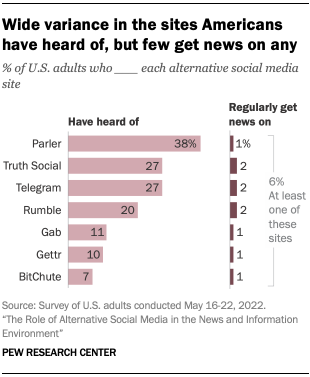
- One-in-ten U.S. adults have heard of Gettr, and only 1% say they regularly get news there. Overall, just 6% of Americans regularly get news from at least one of the seven sites studied, and none of these sites is used for news by more than 2% of U.S. adults. By comparison, a much larger share of Americans use more established sites for news, including Facebook (31%), YouTube (25%) and Twitter (14%).
- While Gettr explicitly identifies itself as supporting free speech and opposing censorship, the site moderates user content to at least some extent. Gettr, like the other six alternative social media platforms the Center studied, says it supports free speech. Gettr also states that it rejects “cancel culture” and is an alternative to Big Tech.
Still, Gettr places some restrictions on the content users post. A review of the site’s moderation features found that Gettr moderates user content at least to some extent beyond spam and legal requirements. - Around nine-in-ten of the most prominent accounts on Gettr are run by individuals. The Center’s recent study examined 200 prominent accounts on Gettr, selected from those with the most followers. As of June 2022, the vast majority of these accounts (92%) are individuals, while 6% are organizations. Some of these accounts run by individuals have a clear past or present affiliation with an organization, such as a government entity or news organization. On Gettr, individuals with an affiliation comprise 14% of prominent accounts.
About one-in-ten of these prominent accounts on Gettr (13%) have been banned or demonetized by other social media sites.
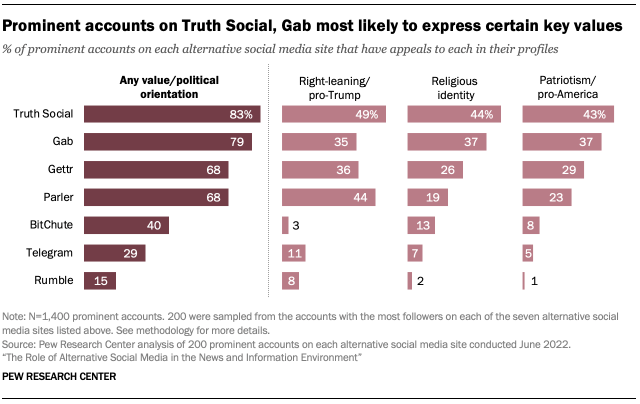
- Roughly a third of prominent accounts on Gettr (36%) are right-leaning or express support for former U.S. President Donald Trump in their profile. About two-thirds of prominent accounts on Gettr (68%) express a political orientation or a value or identity appeal in their profile. About three-in-ten (29%) express patriotic appeals and 26% highlight a religious identity.
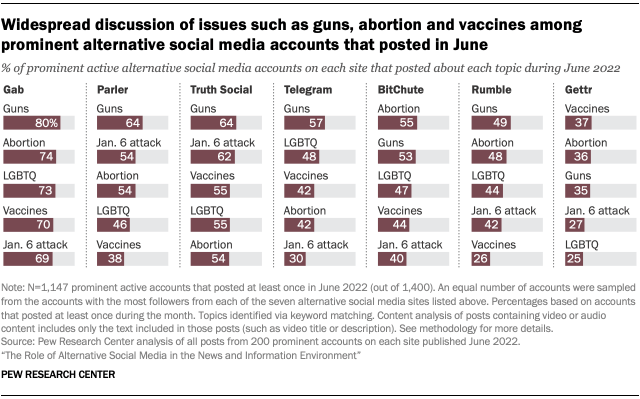
- Vaccines, abortion and guns were among the subjects that prominent Gettr accounts discussed in June 2022. A review of posts from these 200 prominent Gettr accounts found that 37% posted about vaccines in June 2022, 36% posted about abortion, 35% posted about guns, 27% posted about the Jan. 6, 2021, attack on the Capitol and 25% posted about LGBTQ issues. (These posts came amid widespread discussion of several high-profile shootings and the Supreme Court’s decision to overturn Roe v. Wade, and at a time when a U.S. House committee was investigating the Jan. 6 riot. Vaccinations and LGBTQ issues were also regularly in the news.)
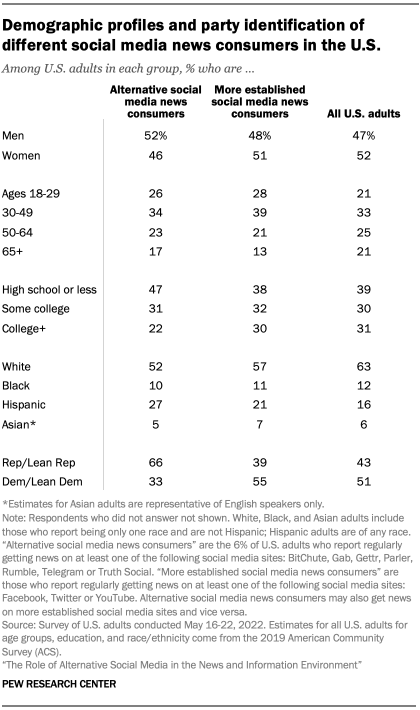
- About two-thirds (66%) of those who regularly get news from any of the seven alternative social media sites studied by the Center – including Gettr – identify as Republicans or lean toward the Republican Party. This is far higher than the share who identify as Democrats or lean Democratic (33%). By comparison, those who get news on at least one of three more established social media sites studied by the Center – Facebook, Twitter and YouTube – are more likely to be Democrats or Democratic-leaning than Republican or Republican-leaning.
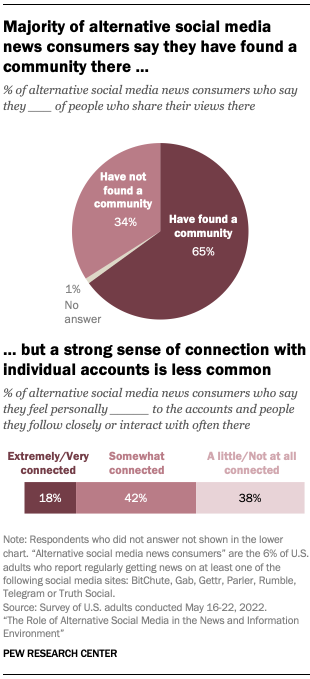
- Roughly two-thirds (65%) of those who regularly get news from any of the seven alternative social media sites studied – including Gettr – say they have found a community of like-minded people there. Although 6% of Americans say they use any of these sites for news, most who do so say they have found a community of people there who share their views. Despite this, a strong sense of connection with individual accounts on the site is less common.
Note: Here are the questions used in the study, detailed tables and the methodology.




